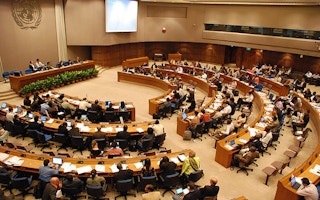Decisions by the Conference of the Parties (COP) of the UN Framework Convention on Climate Change (UNFCCC) are often long, complicated and difficult to understand.
Such decisions favour countries that are represented by English speakers and create a serious disadvantage for other countries.
Why do decisions become long and complicated?
With up to 195 Parties involved in drafting and agreeing COP decisions it is not surprising that decisions can become unclear and confusing.
Parties expect COP decisions to be written in the same style as before.
Complicated words and expressions have become routine. Other Parties might be very surprised if one Party suggested text in a different style (they might even suspect a hidden motive).
Sometimes it may be important for some Parties that certain wording is repeated many times as reassurance that their point of view is taken into account.
Sometimes it is necessary to use many or complicated words to be completely clear what the COP has decided. Most often it is not.
Do long and complicated decisions have any advantages?
One possible advantage of long decisions is that they can include proposals from many Parties.
This may make a decision acceptable to more Parties. For example, some Parties may have instructions from their capitals that certain issues must be included before they can agree to a decision.
“Constructive ambiguity” means wording that is deliberately vague, so that it is open to different interpretations.
It may be helpful sometimes. In other cases it would be better to state what has been agreed and that Parties will continue negotiations on unresolved issues.
Disadvantages
Long, complicated and unclear COP decisions have disadvantages for everyone. For example:
- Party representatives and others need to read much unnecessary text to find the parts that matter
- More text needs to be translated into UN languages, which takes more time and costs more
- It can be very difficult for someone unfamiliar with the history of UNFCCC decisions and specialized terminology to understand what the decisions mean.
The most serious disadvantage is that such decisions make it more difficult for many countries to be involved.
Unfair
The negotiations on COP decisions are usually in English. This gives English speakers a big advantage, especially when the decisions involve complicated or unclear wording.
If a text is difficult to understand for an English speaker – as many COP decisions are – it will be more difficult for people who do not have an excellent understanding of English.
Wording that is complicated and unclear in English can be very difficult to translate into other UN languages. It can become even less clear when translated.
Long, complicated and unclear COP decisions favour Parties represented by people who speak very good English, while creating a serious disadvantage for other Parties. Simpler and clearer COP decisions would be fairer.
Clearer, simpler and fairer
FIELD has pioneered an example of how a COP decision adopted at the Doha Climate Change Conference in 2012 could be made simpler and shorter. The rewritten decision is about half as long as the original decision.
For example, it is seldom essential to repeat paragraphs from earlier decisions. They just take up space. It is usually better to have fewer words than many. Complicated terminology is often not necessary.
Sometimes it can be helpful to add an explanation.
For example, decisions often refer to earlier decisions by their number (such as “decision 1/CMP.8”) without mentioning what the decision is about. Mentioning briefly what the decision concerns could be very helpful.
Otherwise a reader who does not know or remember what the other decision is about needs to look it up.
Structure and style
FIELD recommends that Parties consider an entirely new structure and style for COP decisions.
There are different ways to simplify decisions and no doubt many different opinions about how it should be done, but everyone would benefit from it.
Most importantly, simpler and clearer COP decisions would be much fairer for non-English speaking countries.
Joy Hyvarinen is executive director of the Foundation for International Environmental Law and Development (FIELD). This post originally appeared here.










